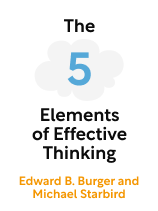

This article is an excerpt from the Shortform book guide to "The 5 Elements of Effective Thinking" by Edward B. Burger and Michael Starbird. Shortform has the world's best summaries and analyses of books you should be reading.
Like this article? Sign up for a free trial here.
What are the flaws and gaps in your logic and knowledge? If you don’t already know what they are, how can you surface them?
Constantly asking questions will help you strengthen your foundational knowledge because it expands your thinking, opening you to new insights about what you already know (or think you know). You can use questions to expose flaws in your reasoning and gaps in your knowledge.
Keep reading to learn about the importance of asking questions when it comes to understanding.
The Importance of Asking Questions
In The 5 Elements of Effective Thinking, Edward B. Burger and Michael Starbird discuss the element of air, which they say represents the constant questioning of what you know and what you’re learning. The authors stress the importance of asking questions to broaden and deepen your current understanding of a topic.
(Shortform note: The principles conveyed in the “air” section reflect many of the same concepts as Inquiry-Based Instruction, which Michael Starbird is a well-known proponent of. Inquiry-Based Instruction emphasizes the value of questioning as a method of learning about a subject. This style of instruction involves giving the student agency over their own learning while the teacher guides that learning through open-ended questions or problems, which students then investigate through questions of their own.)
Just because you already know the answer to a problem doesn’t mean you shouldn’t still ask questions or explore it further by asking a “what if” question. This question can show where the gaps in your understanding are.
(Shortform note: Some educators have suggested that “what if” questions are just one of several kinds of questions you can ask as you seek solutions. “What if” questions explore the myriad directions or possibilities for this information, while “why” questions establish the underlying information and “how might” questions follow through on the “what if” questions to see what solutions can be found.)
Similarly, just because you think you’re supposed to know the right answer to a problem doesn’t mean you shouldn’t ask questions. Being an expert on something means understanding that there are no stupid questions, or, no questions not worth asking. To get you into the mindset of asking questions, the authors recommend that you:
- Don’t pretend to understand something you don’t. Otherwise, you won’t be able to ask effective questions about it that will increase your knowledge or skills about the topic. Instead, ask basic questions to strengthen that foundation.
- Don’t worry about looking “dumb.” Others may have the same question, and according to the authors, asking basic questions actually makes others view you as more intelligent rather than less.
(Shortform note: “Looking dumb” is not the only fear that keeps us from asking questions. Another, sometimes bigger, fear is considering that we might have been wrong about something and having to acknowledge it—we often find it easier to believe we’re correct rather than to ask questions that show that we’re not. This then leads to cognitive dissonance, which causes stress and inhibits growth and learning.)
One technique the authors suggest to help you think of questions is to imagine yourself teaching the idea to someone else. What questions might they ask? Do you know how to answer them? If not, then your understanding is lacking.
(Shortform note: Learning by teaching is an instructional method frequently used in many classrooms. Students may be given a topic and then be tasked with teaching this topic to another student or to the rest of the class. This method is based on the principle of the “protégé effect,” which describes how the cognitive and metacognitive processes involved in teaching something strengthen the “teacher’s” understanding of it.)

———End of Preview———
Like what you just read? Read the rest of the world's best book summary and analysis of Edward B. Burger and Michael Starbird's "The 5 Elements of Effective Thinking" at Shortform.
Here's what you'll find in our full The 5 Elements of Effective Thinking summary:
- The 5 principles for learning to think effectively
- What it means to learn beyond memorizing
- Why you need to be willing to change if you want to learn






